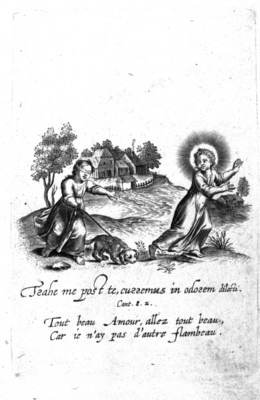Ludovicus van Leuven, Amoris divini et humani antipathia (1629)
Table of contents ↑Caligo Amoris [75]

XXXIII.
{?}arp.
CAnis est symbolū odoris, odor est symbolū fi-
dei; anima hoc cane ducitur, que nudâ fide abs-
que vllâ intellectus operatione, immediatè per ar-
dorē amoris mouetur ad contemplandū Deum &
constituitur in quadā caligine, quænon potest ra-
tione aut intellectu comprehendi in quâamorosa
anima experiri incipit, quod omnis illa contēplans
& intuitiua cognitio quæ præcessit in imagini-
bus & similitudinibus, & etiā omne quod per in-
tellectum humanū & cogitationem nudam ima-
ginari valet, ab ipsa veritate diuinæ essentiæ in in-
finitum suâ dissimilitudine distant. Hinc intelle-
ctualem oculum denudans à corporalibus, spiri-
tualibus & etiam diuinis imaginibus, quantum-
libet sublimes & nobiles sint, ingreditur caligi-
nem, vbi in quâ dā Dei perfectâ ignorantiâ con-
stituitur, velut inter duas mensas, ibique fame
potius perire eligit, quam descendere ad mensam
inferiorem, vbi Deus in imaginibus & similitudi-
nibus cognoscitur: ad mensam vero superiorem
vbi Deus in nudâ sua essentiâ cognoscitur adire
non permittitur. sic igitur manet in nudâ caligine
& nihileitate cogitationis suæ, immediatè coram
ignotâ gloriosâ diuinitatis præ sentiâ.
CAnis est symbolū odoris, odor est symbolū fi-
dei; anima hoc cane ducitur, que nudâ fide abs-
que vllâ intellectus operatione, immediatè per ar-
dorē amoris mouetur ad contemplandū Deum &
constituitur in quadā caligine, quænon potest ra-
tione aut intellectu comprehendi in quâamorosa
anima experiri incipit, quod omnis illa contēplans
& intuitiua cognitio quæ præcessit in imagini-
bus & similitudinibus, & etiā omne quod per in-
tellectum humanū & cogitationem nudam ima-
ginari valet, ab ipsa veritate diuinæ essentiæ in in-
finitum suâ dissimilitudine distant. Hinc intelle-
ctualem oculum denudans à corporalibus, spiri-
tualibus & etiam diuinis imaginibus, quantum-
libet sublimes & nobiles sint, ingreditur caligi-
nem, vbi in quâ dā Dei perfectâ ignorantiâ con-
stituitur, velut inter duas mensas, ibique fame
potius perire eligit, quam descendere ad mensam
inferiorem, vbi Deus in imaginibus & similitudi-
nibus cognoscitur: ad mensam vero superiorem
vbi Deus in nudâ sua essentiâ cognoscitur adire
non permittitur. sic igitur manet in nudâ caligine
& nihileitate cogitationis suæ, immediatè coram
ignotâ gloriosâ diuinitatis præ sentiâ.

Nuict de l'Amour.
XXXIII.
Quand la splendeur de la vermeille aurore,
Et le soleil qui luy succede, & dore
Tout l'vniuers, refuseroit le jour;
Ie ne veux pas, pour faire ma carriere,
D'autre clarté, conduitte, ny lumiere,
Que le flambeau & guide de l'amour.
XXXIII.
Quand la splendeur de la vermeille aurore,
Et le soleil qui luy succede, & dore
Tout l'vniuers, refuseroit le jour;
Ie ne veux pas, pour faire ma carriere,
D'autre clarté, conduitte, ny lumiere,
Que le flambeau & guide de l'amour.
Translations
 |
Darkness of love. |
 |
Draw me, we will run into the scent of the beloved. |
Sources and parallels
-
Possibly based on, different motto, nimbus given to Christ-child and background landscape added, in: Deductio amoris. [31]
 (in: anonymous, Amoris divini et humani antipathia (1628)
(in: anonymous, Amoris divini et humani antipathia (1628) )
[Compare
)
[Compare ]
]
-
Same copperplate, slightly altered, in: Liefde is de beste leidsman [21]
 (in: Willem den Elger, Zinne-beelden der liefde (1703)
(in: Willem den Elger, Zinne-beelden der liefde (1703) )
[Compare
)
[Compare ]
]
-
Leader dog also in: Un Amour aveugle conduit par un Chien
 (in: Daniel de la Feuille, Devises et emblemes (1691)
(in: Daniel de la Feuille, Devises et emblemes (1691) )
[Compare
)
[Compare ]
]
-
Leader dog also in: Utinam dirigantur viæ meæ ad custodiendas iustificationes tuas! [17]
 (in: Justus de Harduwijn, Goddelycke wenschen (1629)
(in: Justus de Harduwijn, Goddelycke wenschen (1629) )
[Compare
)
[Compare ]
]
-
Leader dog also in: Utinam dirigantur viæ meæ ad custodiendas justificationes tuas! [17]
 (in: Jan Suderman, De godlievende ziel (1724)
(in: Jan Suderman, De godlievende ziel (1724) )
[Compare
)
[Compare ]
]
-
Porteman 1975, p. 213. Same pictura, same quote in: Hugo, Pia desideria
 , bk/embl. 2/23
, bk/embl. 2/23
References, across this site, to this page:
- Deductio amoris. [31]
 (in: anonymous, Amoris divini et humani antipathia (1628)
(in: anonymous, Amoris divini et humani antipathia (1628) )
)
- Liefde is de beste leidsman [21]
 (in: Willem den Elger, Zinne-beelden der liefde (1703)
(in: Willem den Elger, Zinne-beelden der liefde (1703) )
)
- Un Amour aveugle conduit par un Chien
 (in: Daniel de la Feuille, Devises et emblemes (1691)
(in: Daniel de la Feuille, Devises et emblemes (1691) )
)
- Utinam dirigantur viæ meæ ad custodiendas iustificationes tuas! [17]
 (in: Justus de Harduwijn, Goddelycke wenschen (1629)
(in: Justus de Harduwijn, Goddelycke wenschen (1629) )
)
- Utinam dirigantur viæ meæ ad custodiendas justificationes tuas! [17]
 (in: Jan Suderman, De godlievende ziel (1724)
(in: Jan Suderman, De godlievende ziel (1724) )
)

